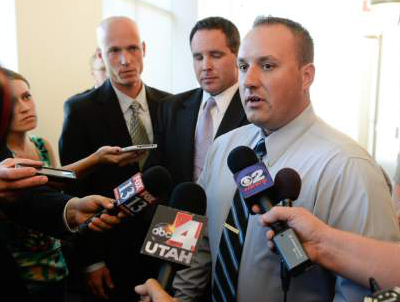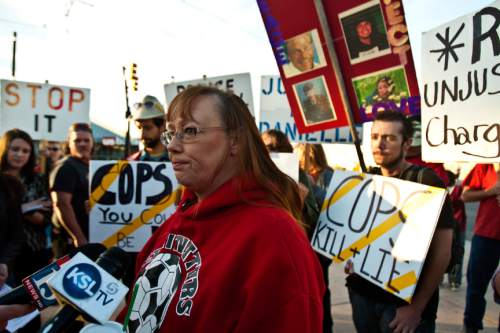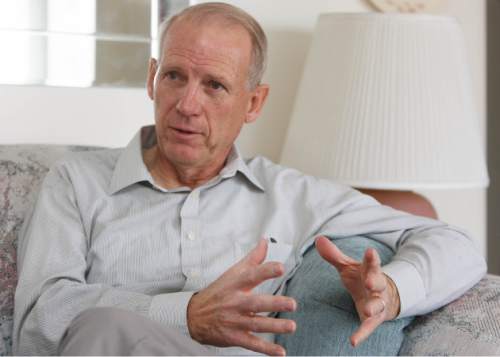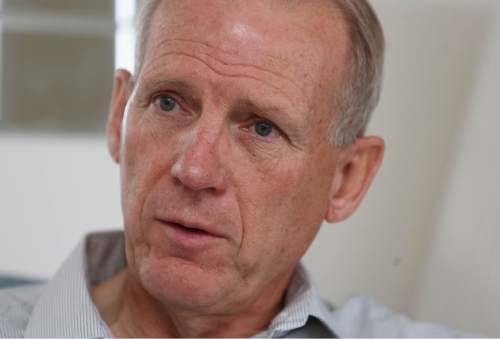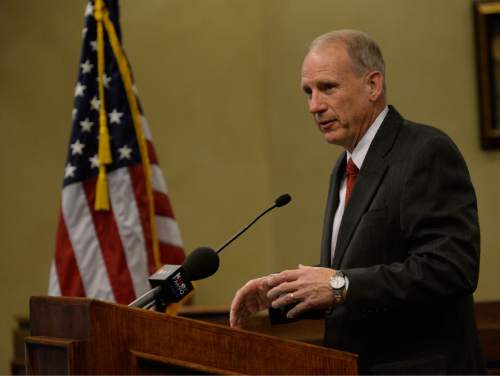This is an archived article that was published on sltrib.com in 2015, and information in the article may be outdated. It is provided only for personal research purposes and may not be reprinted.
West Valley City • Administrators in Utah's second largest city say the records of the police internal affairs investigation into former officer Kevin Salmon, one of two detectives involved in the 2012 shooting death of Danielle Willard, are private and protected and won't be released to the public.
The Salt Lake Tribune has appealed the denial of its request for those documents to the West Valley City Council, which will deliberate behind closed doors following a public hearing held Tuesday night.
"We've heard from the other officer involved in the Nov. 2 [2012] incident. He had a day in court," Tribune reporter Nate Carlisle told the council, referring to former West Valley detective Shaun Cowley, whose manslaughter charge in the Willard case was dismissed at his preliminary hearing in October.
"We've not learned a lot about Mr. Salmon's role on that day," Carlisle said. "We know that the district attorney decided that there was nothing criminal about his behavior but we don't know what Mr. Salmon told investigators and we don't know what West Valley City investigators found."
Cowley and Salmon, working undercover, both fired at Willard during the course of a drug investigation, but Cowley fired the first and fatal shot at the unarmed woman. Cowley was fired for allegedly mishandling evidence, but Salmon remained on administrative leave until he resigned Oct. 9, before the internal affairs investigation was completed.
A police review board found he had used excessive force in the case but disagreed with District Attorney Sim Gill's conclusion that the shooting was unjustified, according to a one-page document released earlier to The Tribune.
Among records being withheld as confidential are tapes and transcripts of two interviews with Salmon: one a statement he provided at his attorney's office, along with responses to a few questions from West Valley officials, and the other an interview with FBI and Department of Justice investigators.
The other document being kept under wraps is a recommendation from the deputy police chief regarding whether Salmon violated policy or should be disciplined. The police chief never made a determination in the matter.
Martha Stonebrook, public safety attorney for the city, denied access to the records, saying they are private and protected because their release would constitute a "clearly unwarranted invasion of personal privacy," and also could interfere with disciplinary investigations or proceedings.
That decision was upheld by City Manager Wayne Pyle before being appealed to the City Council, which has the final say in administrative appeals. If the council sides with city administrators, the only recourse is an appeal to district court.
Stonebrook urged the council to keep the records private because there was no completed investigation in the Salmon case.
Making those documents public, she said, "would allow all kinds of speculation and conjecture as to whether or not the officer or any other public employee actually did what he or she is alleged to have done."
Stonebrook asserted that "anyone can allege anything about any public employee or officer; that doesn't mean those allegations are sufficient and they have been sustained."
She said the city has a longstanding policy that "investigative files do not go out."
In the case of police disciplinary proceedings, release of records from an uncompleted probe could have a "chilling effect" on such investigations in the future, she asserted.
"If you, a police officer in today's climate, you're just called in to answer some questions, if then your name is out there simply because your employer called you in and said, 'You might have seen or heard something,' if that goes out prior to an investigation being completed it could be a problem," Stonebrook said.
The council made no decision on the release of the requested information.
Mayor Ron Bigelow, a member of the council and a former state lawmaker, said he was torn on the issue.
"I'm trying to reconcile within myself how we meet this transparency need [for open government] and being fair … because it might damage an individual."
But he made it clear he didn't have high regard for the news media's motivation in trying to obtain such records.
"You release the whole file to the media, they're not going to publish the whole file, they're going to pick out the most sensational part that causes people to buy their newspaper or listen to their radio program. They don't do it 'fairly,' they do it to provide information on certain pieces and that could very easily and has in the past caused damage to police officers.
"Does that then justify us not releasing anything because the media could do it based on certain pieces of what they show? It's kind of like the Rodney King incident; that was videotaped and if you watched the whole thing you got a very different story versus what was shown on the media."
Steve Buhler, the only attorney on the council, seemed at times skeptical of the city's reasoning that investigative records are kept private during a probe to protect its integrity, but then must remain closed forever if the investigation never reaches a conclusion.
He also took issue with Stonebrook's assertions about the disclosure of such records having a chilling effect and spurring conjecture and speculation, noting that none of those words or phrases is contained in the state open-records law.
"This body has refused [in the past] to release records based on the statute because of an ongoing investigation. When the investigation was concluded we did release the records. I would refer to the records in the Joshua Powell investigation," Buhler said, referring to the former West Valley City resident suspected in the disappearance of his wife Susan Powell, who later killed himself and his two young children in Washington state.
"We were happy to release those [records] when we concluded we had no more trails to follow and the investigation was concluded. Here, the question is really, this investigation was not concluded and will not be concluded and I don't think that's explicitly covered by the statute and that's where we have to exercise our judgment."
The council plans to conduct two closed-door discussions before announcing a decision next Tuesday.
Carlisle urged members to remember the public interest when deliberating.
"Someone here made the comment that Mr. Salmon [in his two interviews] had an opportunity to tell his side of what occurred on Nov. 2, [2012] and I'm eager to hear that and I think the public is eager to hear that as well."


